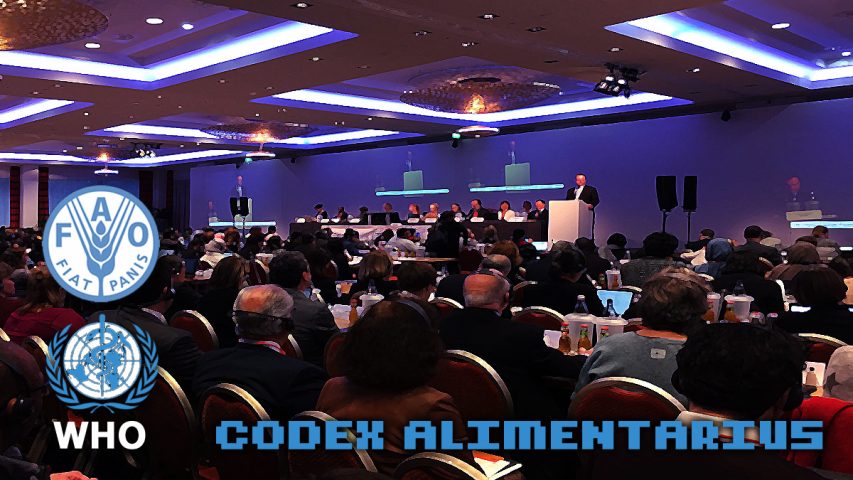- Have any questions? Contact us!
- info@dr-rath-foundation.org

Study Reveals About 60 Per Cent Cancer Patients Do Not Respond Effectively To Chemotherapy Treatments
October 29, 2020
High Intake Of Vitamins A, E And D Linked To Fewer Respiratory Illnesses, Says Study
November 5, 2020The Codex Alimentarius Threat To Your Supplements Didn’t Go Away, It Just Went To Sleep. And It’s Coming Back

To people living outside of Europe, the recent news about the Brussels EU trying to set maximum levels for vitamins and minerals in supplements may not have seemed important. With the world conveniently distracted by the coronavirus crisis, it is easy to imagine that potential legislative developments in Europe have no global significance. In reality, however, if the Brussels EU is successful in enforcing maximum levels for supplements in Europe, it will quickly move to export them worldwide through its influence over the so-called ‘Codex Alimentarius Commission’. Should this happen, the rights of supplement users worldwide could be severely impacted.
Established in 1963, the Codex Alimentarius Commission (CODEX) sets global standards, guidelines, and codes of practice for the food and nutritional supplement industries. Funded by the Bill Gates-controlled World Health Organization (WHO) and the Food and Agriculture Organization of the United Nations (FAO), CODEX is the primary political battlefield where the war is being waged over who controls and regulates the global food and nutrient supply. The pharmaceutical, chemical, biotech, and industrial-scale agriculture industries are powerful stakeholders in this war. Representatives from these industries have been regular attendees at CODEX meetings.
While the adoption by countries of the various standards and guidelines developed by CODEX is theoretically optional, the creation of the World Trade Organization (WTO) on 1 January 1995 essentially changed their status in that they became used by the WTO as the benchmark in its adjudication of international trade disputes. This effectively gave CODEX standards and guidelines legal status in the global trade system and acts as a strong inducement for WTO member countries to implement them into their national legislation.
The CODEX and Brussels EU game plan
The Brussels EU already has an existing framework at CODEX through which global limits for vitamins and minerals in supplements could be set. Known as the ‘Guidelines for Vitamin and Mineral Food Supplements’, it was finalized at a meeting of the Codex Alimentarius Commission held in Rome in 2005. The text of this framework specifies that maximum amounts for vitamins and minerals shall be set based on risk assessment and other restrictive criteria. Notably, these criteria take no account of the benefits of vitamins and minerals. The end result of this approach could see the eventual setting of maximum levels at the global level that are similar to the so-called Recommended Daily Allowance (RDA) values commonly advocated by governments.
The blueprint for the CODEX ‘Guidelines for Vitamin and Mineral Food Supplements’ was a piece of Brussels EU legislation known as the ‘Food Supplements Directive’. Passed in Europe in 2002 this law contains all the main elements of the CODEX text, including the specification that maximum amounts of vitamins and minerals shall be set. As soon as the ‘Food Supplements Directive’ was implemented in Europe, the Brussels EU quickly turned its attention to CODEX with the goal of bringing in a similar framework at the global level.
The CODEX ‘Guidelines for Vitamin and Mineral Food Supplements’ were drawn up by a committee known as the ‘Codex Committee on Nutrition and Foods for Special Dietary Uses’ (CCNFSDU). Hosted by the government of Germany, the CCNFSDU had been trying for more than a decade to pass global restrictions on the use of supplements. At CCNFSDU meetings held in 2003 and 2004, the Brussels EU pushed hard for the ‘Guidelines for Vitamin and Mineral Food Supplements’ to resemble the legislation it had recently passed in Europe. As a result, much of the text contained in the CODEX Guidelines is remarkably similar to that found in the Brussels EU Directive.
Based on this history, the game plan for the global enforcement of maximum levels for vitamins and minerals can be seen to involve two main steps. First, the Brussels EU aims to enforce maximum levels in Europe. Then, once this is done, it will push for the setting of near-identical levels worldwide via the further development of the CODEX ‘Guidelines for Vitamin and Mineral Food Supplements’.
Anyone who doubts that bringing in such restrictions would be possible at the global level needs to realize that, within the CODEX system, the 27 Brussels EU member state countries are easily now the strongest political influence. Having already used this game plan once before to set up the CODEX ‘Guidelines for Vitamin and Mineral Food Supplements’ back in 2005, the Brussels EU will inevitably be seeking to use it again to enforce maximum levels worldwide. Natural health advocates everywhere would be well advised to keep a close eye on this potential development. Make no mistake: our human rights are at threat!




